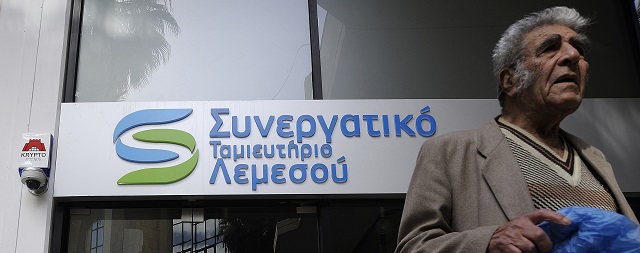Unfair is too lousy a word to describe the iconography that increasingly fills the rational gaps in most arguments around the stream of events triggered by the euro crisis. Take, for instance, Morten Morland’s cartoon in The Times on Monday: a couple of servants, dressed from head to toe in European Union-flag robes, drag an astonished man who embodies Cypriot savers as a sacrificial victim towards a colossal golden sphynx-like statue of Chancellor Angela Merkel. A bag full of euros hangs from each of her gigantic, menacing fists.
This depiction of the grotesque in the euro zone’s latest news will undoubtedly go down well with readers in England–and the Med club countries, too, by the way–but the truth is that bank account holders in the common currency area should have little innocence left by now. Least of all, in Cyprus.
Here’s why. While, let’s say, the average German bank deposits have returned some $130 per $1,000 since 2008, the Cypriot figure almost doubles that amount to $242. The data come from the Central Bank of Cyprus and made headlines today. Yield information like this throws a very different light over what is happening this week in Cyprus.
Yet, I would agree that these numbers aren’t exactly proof of the people of Cyprus co-operating with the money-laundering machine their lenders had allegedly become, nor it is an excuse to raid a percentage of its hard-working savers’ cash.
Or is it? Earlier this afternoon I exchanged a few tweets with @eduardvoltas, who is the publisher of the extraordinarily successful TimeOut Barcelona–one of the best-selling editions of the entire brand. Voltas was, like many, many other southern Europeans, outraged by the Eurogroup imposing a progressive one-off tax (“special”, I believe it’s the term) on savings. Did all Cypriot savers vote for the current government that follows Brussels’ orders? Or the one that mismanaged the economy? Must below-€100,000 savings be penalised, hand in hand with those much higher of dubious, suspicious origin? To all these questions Voltas posed to me and the wider Twittersphere, the unequivocal moral answer appears to be a resounding “No!” I fear it would be a patronising reply, too.
Voltas is the perfect representation of a well-educated, entrepreneurial, influential middle class among which the only hope for the PIIGS resides. That his reaction to the Cyprus crisis is a mere, although profound, revulsion before the injustice that looms over ordinary people in Cyprus is telling: it’s time they change gear. The squeezed taxpayers of the eurozone can ill afford their usual passive response to how financial entities and politicians treat them.
When did Europeans forgot how to vote with their feet, open bank accounts with their feet, or invest with their feet? What pain bank depositors will suffer in Cyprus or may endure elsewhere needs to be shared with those who planned it and implemented it: it is called “enlightened self-interest” and Adam Smith wrote about it more than two hundred years ago. That is to say, those who are too greedy will only restrain their vice when they see their own interests hit.






Be the first to comment on "Cypriot savers’ fault"